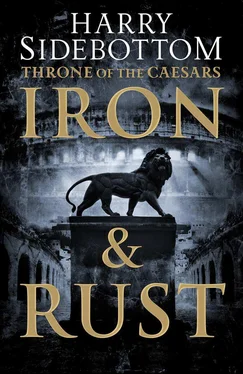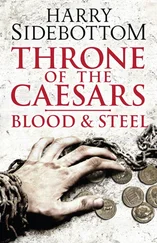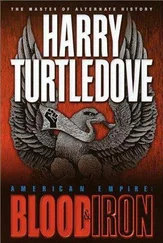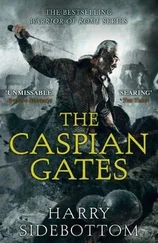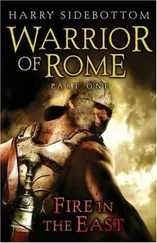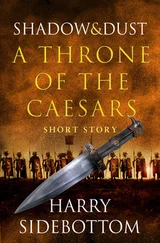Harry Sidebottom - Iron and Rust
Здесь есть возможность читать онлайн «Harry Sidebottom - Iron and Rust» — ознакомительный отрывок электронной книги совершенно бесплатно, а после прочтения отрывка купить полную версию. В некоторых случаях можно слушать аудио, скачать через торрент в формате fb2 и присутствует краткое содержание. Год выпуска: 2014, Издательство: HarperCollins Publishers, Жанр: Исторические приключения, на английском языке. Описание произведения, (предисловие) а так же отзывы посетителей доступны на портале библиотеки ЛибКат.
- Название:Iron and Rust
- Автор:
- Издательство:HarperCollins Publishers
- Жанр:
- Год:2014
- ISBN:нет данных
- Рейтинг книги:4 / 5. Голосов: 1
-
Избранное:Добавить в избранное
- Отзывы:
-
Ваша оценка:
- 80
- 1
- 2
- 3
- 4
- 5
Iron and Rust: краткое содержание, описание и аннотация
Предлагаем к чтению аннотацию, описание, краткое содержание или предисловие (зависит от того, что написал сам автор книги «Iron and Rust»). Если вы не нашли необходимую информацию о книге — напишите в комментариях, мы постараемся отыскать её.
Iron and Rust — читать онлайн ознакомительный отрывок
Ниже представлен текст книги, разбитый по страницам. Система сохранения места последней прочитанной страницы, позволяет с удобством читать онлайн бесплатно книгу «Iron and Rust», без необходимости каждый раз заново искать на чём Вы остановились. Поставьте закладку, и сможете в любой момент перейти на страницу, на которой закончили чтение.
Интервал:
Закладка:
The briefest of pauses, and Gordian recognized him. With a curious precision and delicacy of footwork, Nuffuzi’s son feinted and lunged. Gordian took the strike high up near the pommel. This youth could fight. The sound of shouting from behind. No time for that. Gordian parried and riposted.
Sweat stinging in his eyes. Pain in his chest. Gordian was tiring, his movements slowing, growing clumsy. He had to finish this soon. He forced his feet to move, thrust to the face, and pulled back to buy himself some time. The shouting was louder. Some of the nomads were looking up over the knot of soldiers, others glancing over their shoulders. Nuffuzi’s son struck again. Gordian’s slight distraction almost killed him. A late, desperate block forced the blade down. It sliced open his left thigh. He staggered, fighting for balance. The youth readied the killing blow. Gordian brought his sword into a shaky guard. On either side the nomads were stepping back. Nuffuzi’s son shouted, glared at his warriors. Gordian stepped off his right foot, on to his left — a sickening surge of pain — and brought the edge of his blade down into his opponent’s right wrist. The youth screamed and dropped his sword. Before he could double up, Gordian got the point of his weapon up under his chin.
‘Surrender.’
Clutching his wounded arm, eyes wide, the young chief said nothing.
All the nomads were running. A drift wrack of bodies and abandoned weapons left behind across the shaded street. The shouting from the citadel redoubled.
‘Surrender.’
Despite the pain and the imminence of death, Nuffuzi’s son kept his dignity. ‘I surrender.’
Now Gordian could make sense of the shouting.
‘ Menophilus! Menophilus! ’
CHAPTER 6
The Northern Frontier
A Camp outside Mogontiacum,
The Kalends of April, AD235
Outside the imperial pavilions, Timesitheus stood with the governor of Germania Superior, Catius Priscillianus. Behind them, the others were growing restive. They were all waiting for admittance into the presence of the Emperor, and they had all been there some time. The morning was wearing on. The chill wind from across the river was plucking at the folds of carefully arranged togas, teasing neatly arranged hair into disorder. It was getting cold. Men were beginning to talk at more than a respectful murmur, and to shift about. Sanctus, the Master of Admissions of the court, darted here and there. The ab Admissionibus was relentless in his attempts at chivvying men back into the correct precedence and demeanour.
Timesitheus nodded in the direction of the busy imperial functionary. ‘If he had been this diligent in controlling who was let in during the last reign, Alexander would still be alive today.’
Catius Priscillianus laughed, not very loud, and not very long. That was perfunctory, Timesitheus thought. Far too perfunctory for a joke made by the acting governor of the neighbouring province of Germania Inferior, the man who was overseeing the finances in both their provinces and that of Belgica as well. Nowhere near enough for a joke by the man charged with the logistics of the whole northern campaign. And, questions of the elevation and propinquity of offices aside, Timesitheus was acknowledged to be one of the closest intimates of Priscillianus’ brother Catius Celer. Some greater show of hilarity would have been appropriate.
Still, it might have been just the weather. Priscillianus had not been back up on the frontier all that long. No time to get used to its ghastliness all over again. Timesitheus’ thoughts ran to his own initial venture into this gods-forsaken region years before. Nothing in his previous travels had prepared him. Leaving Greece for the very first time, he had passed through Italy on his way to his inaugural military command in Spain. A year later, he had retraced his route and beyond to Arabia. Another year — his career had flourished from the beginning — and he was sent to the North. Now it was more than a decade ago, but he remembered his arrival clearly. It had been autumn, the sky grey, the air sharp like a knife. He had not thought it could get colder. He had been wrong. That winter the Rhine had frozen, not only the shallow, winding side-channels but the main stream itself. You could walk across, drive a carriage over. The locals and soldiers, muffled and indistinguishable, had cut holes in the ice to fish. It was said that the frozen waters had trapped terrible man-murdering monsters so huge that teams of oxen had to be used to pull them out. Apparently, they looked like enormous catfish, only blacker and stronger, although Timesitheus had not seen them himself.
Priscillianus produced a handkerchief. A fine, purple one, maybe from Sarepta in Phoenicia by the look of it. Very expensive, Timesitheus thought. Priscillianus dabbed his nose. Hypochondria also might have curtailed his appreciation of humour. All three of the Catii brothers spent a great deal of time judging their health, and usually they found it wanting. Twenty-four-hour-fevers and two-day chills, black humours and common colds, each brought on by exposure to the elements or being cooped up inside, their lives were measured by many, much deliberated ailments. Even writing from Rome, exulting at his appointment as one of the Praetors for this year, Timesitheus’ dearest Catius Celer — the youngest of the brood — had complained of a headache, a sprained wrist and finding a snake in his bed.
Trepidation might have to be included in a consideration of Priscillianus’ state of mind. A level of apprehension came with any invitation to the council of an Emperor. This could only be heightened when it was the first consilium of the reign. Rewards would be handed out: magistracies, commands, proximity to the throne and influence. But, to clear the way for supporters and other favoured recipients, existing men must fall. They were all bound to chance, like Ixion to the wheel.
So far, only the permanent board of sixteen Senators had been allowed beyond the purple hangings. Some time ago, the Master of Admissions had said the provincial governors would enter next. There were five governors with the field army. Yet just Timesitheus and Priscillianus stood waiting in the wind. Given the turn of events, Flavius Vopiscus of Panonnia Superior would no longer need to mark time with the rest of the gubernatorial herd. But what had happened to Faltonius Nicomachus of Noricum and Tacitus of Raetia? One possibility was promotion. They might be inside already, ushered in by a secret door. Now snug and close to the Emperor, they were whispering into his ear with Flavius Vopiscus. Or perhaps they were riding hard to some new and prestigious post, to Rome or one of the great and wealthy provinces of Africa or the East, their anticipation and exertions warming their blood. None of the other possibilities was so good. Forced retirement was the best; a life of dissembling, pretending to be grateful for an existence free of the heat and dust of politics. Beyond that lay only some terrible combination of arrest, torture, condemnation and confiscation, exile and execution.
Yes, Priscillianus might be feeling a certain trepidation. Yet he was a nobilis , an aristocrat with two influential brothers and many ancestral connections. Timesitheus lacked those possible sureties. He had risen high — some would say too high. He was an equestrian from a Greek backwater. His main patron was elderly, and his sole relative was his own dependant. Timesitheus had no protection except his intelligence and an acquired fortune, and both attracted envy. He was more than anxious.
It would not have been so bad if his wife has been with him. On his decision, Tranquillina had remained behind in Colonia Agrippinensis. She was to keep an eye on Axius, the Procurator he had placed in charge of the province. It had been a mistake. Axius really did not need watching, and Timesitheus needed his wife by his side. She had ways of calming him, of putting things in a better perspective. And she had foresight; better than his own, he now had to admit. If she had been here, the coup would not have caught him by surprise and left him unprepared. He hated being unprepared. He was frightened.
Читать дальшеИнтервал:
Закладка:
Похожие книги на «Iron and Rust»
Представляем Вашему вниманию похожие книги на «Iron and Rust» списком для выбора. Мы отобрали схожую по названию и смыслу литературу в надежде предоставить читателям больше вариантов отыскать новые, интересные, ещё непрочитанные произведения.
Обсуждение, отзывы о книге «Iron and Rust» и просто собственные мнения читателей. Оставьте ваши комментарии, напишите, что Вы думаете о произведении, его смысле или главных героях. Укажите что конкретно понравилось, а что нет, и почему Вы так считаете.
